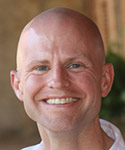As a leader, you will rarely have all the information you want.
You will set budgets not knowing how the market will perform over the next few years, unable to predict endowment income. You will hire faculty and plan course catalogs not knowing whether nonresidential theological coursework will remain popular with students or permissible to denominations. You will launch capital campaigns and begin building projects not knowing whether either is the right next step into the future. You will ordain people not knowing how they will behave when sent to a parish for the first time. You will preach and teach and serve not knowing how broken people will receive your words, your witness, your ministry.
Rarely will you know all that you want to know when you want to know it. So the question becomes: what to do, knowing this?
For some leaders, this truth is almost paralyzing, leading to endless vacillation or procrastination. These leaders are so afraid of making the wrong decision that they make no decision at all -- which itself ultimately becomes a decision, translating into missed opportunities, injured relationships, damaged reputations and weakened organizations.
For other leaders, this reality can fuel a kind of unmoored recklessness, with no internal coherence among decisions made or actions taken. While the self-justifying rationale offered for each decision is the same -- “I’m just doing the best I can with what I know now” -- it can lead to an undermining and alarming unpredictability, to programs or initiatives that are inconsistent with the mission of an institution, to bewilderment and frustration on the part of co-workers and colleagues, to confusion within boards and misunderstandings on the part of external constituents.
Yet in the face of incomplete information, there is a middle way between paralysis and recklessness. It is a way of faithfulness, a way of acting with courage in the world despite our limitations.
Recently, I attended an event where one of the most accomplished and effective leaders I have ever encountered was reflecting on his time as a senior leader in the church.
At the end of his formal remarks about his ministry, he agreed to receive questions from the audience. After several polite and predictable exchanges, one audience member asked a curious question about what ideas this leader had for how the church should be responding to the catastrophic effects of global warming.
His answer? “I don’t have many ideas; I have instincts. And what I have learned over my years of leadership is that I have well-formed instincts.”
If you knew nothing of this leader’s life, you might think that this answer was the kind of stereotypical C-suite bravado that tends toward recklessness: “I just trust my gut.”
But when you know that his life is patterned by prayer, sacramental devotion and intentional practices of reflection and learning, then you begin to understand that his instincts are oriented toward a different end.
They have been shaped by the weight of sacred text and tradition, and by his reflections on his experiences and experiments in ministry. He understands that both his instincts and his actions are reflective of something grander and larger than his own gut or the church’s bottom line; they are accountable to his understanding of the hopes and dreams of God for all of creation.
To lead knowing that we will never know all that we would like to is where sight meets faith in our leadership practice. It is the place where our own robust formation, our ongoing spiritual practice and our intentional discernment are proved indispensable, for these things help us re-narrate the questions that inevitably come, questions like those posed in every one of the situations named above. These practices help us see that each situation requires something far more deeply grounded than logic and data. Each one requires a certain attentiveness to what God is doing in the world and how our actions might further or hinder that work.
In the early days of Leadership Education at Duke Divinity, my colleague Greg Jones articulated this in a slightly different way. He wrote that what sets Christian leadership apart from other kinds of leadership is its telos, that Christian leadership is oriented toward the cultivation of “thriving communities that bear witness to the inbreaking reign of God that Jesus announces and embodies in all that we do and are.”
In times when we know less than we wish we did or when the information we do have is unclear, the gift of our formation, our practice and our discernment is clarity about the aim of our leadership, and that leads to faithful instincts.








